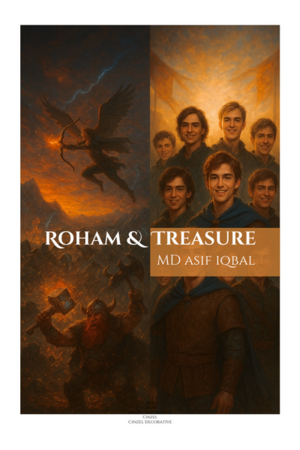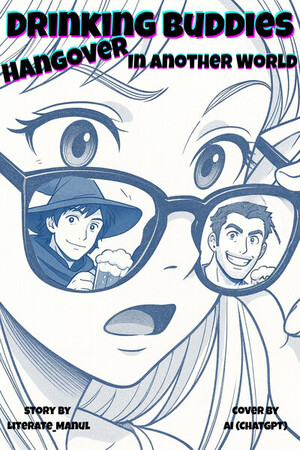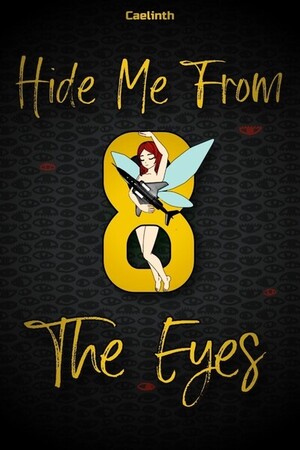Chapter 7:
The Tale of Four Tigers
Roham And Treasure
Joremir—like the edge of the world, yet alive with the footsteps of countless peoples, a last refuge for weary travelers of the great continent. Old lamps hung from thick wooden beams above, their dim flames flickering, making the smoke curl and dance like restless shadows.
The air was heavy—with the spice of exotic herbs, the salty breath of the sea, and the leathery scent of age. Together they wove a dreamlike haze, a half-sleep.
The walls were wooden, marked with patches of salt, planks cut long ago from ancient ships. The tables shook, rattling even at a whisper of wind. Somewhere, someone laughed too loudly. Somewhere else, the sound fell silent all at once.
In the southern corner sat Salih. Against a wall decorated with old seabird feathers, he seemed apart from the chaos around him—set apart, like a character lost in his own trance. Laughter, scraping chairs, smoke spirals—all swirled around him, yet he remained an island, wrapped in a spell of solitude.
Before him lay a copper plate: fried coral fish, its golden-red flesh glistening, layers of oil and spice carrying the weight of recipes passed down for generations. The smell stirred not only hunger but the deeper corners of the mind. Beside it lay thick bread smeared with ghee, steaming so hot the air above it twisted, and in a small bowl, butter melted slowly, like a thick river of milk flowing down from the Himalayas.
Salih tore off a piece of bread, dipped it into the fish, and closed his eyes as he ate. Each bite was like a memory of the sea, like a forgotten evening hidden in the roar of waves.
Then—suddenly—the heavy thud of leather boots echoed across the tavern floor. Each step landed like rain on stone, cutting through the stillness, growing closer.
A man entered. He wore a white shirt—so clean it shone, catching the light like sunlight breaking through dawn mist. His body was enormous, his shadow filling the room like a mountain had walked inside. His chin was rough with beard, his eyes carried the weight of battles, farewells, revenge, and burdens long borne.
As he passed Salih’s chair, his heavy foot struck against one of its legs. His balance broke.
Crash!
He stumbled forward, sprawling over a nearby table.
That table was laden—alive with abundance. At its center steamed a great copper pot of scarlet meat stew. Around it sat three brass bowls of thick soups, their spices stained with the colors of sunset—orange, green, cloudy and rich. These dishes weren’t mere food, but childhood stories, fog from old kitchens, the history of fire and spice.
The fragrance had been thick in the air—until the next moment, when the stew and soups went flying, spilling down onto the man seated at the table.
He was massive, like a fortress wall that no gold hammer could crack. He wore a blue leather jerkin, and now the red stew slid down it like blood across a battlefield. His hair was tied back, his eyes blazing fire—but beneath that fire ran a frozen river, cold and waiting. A tremor tugged at his lips, a blend of hunger and fury ready to explode.
Slowly, he rose. His eyes, round as coins, burned bright. His voice shook—not only with rage, but with insult, with disbelief.
“Are you blind, you bastard?!”
His roar rattled the tavern’s wooden ceiling like thunder.
He lunged toward the man in the white shirt.
The white-shirted giant clenched his jaw, replying,
“I didn’t mean for this to happen. But if you speak another word—”
The tavern froze.
Plates stilled. Spoons halted in mid-air. Half-smiles froze on faces. Even the fragrance of spice seemed to stop, listening for the victor of this clash.
A child’s cry, once ringing, cut off. The very dust motes in the air seemed to hold their breath. A few men half-rose from their seats, ready—because any second, words could become fists, and fists could become war.
Salih leaned back a little and slowly raised his glass of juice. The glass shimmered with a rare drink—made from apples and wild honey—its color glowing like the red-orange of a sunset. He took a sip, wetting his lips, then turned his head toward the quarrel.
In his eyes—excitement, a cold curiosity. He looked not like a man caught in danger, but like a spectator, sitting in the front row of a theater, already knowing who in the next act would fall silent… or die. His gaze rested first on the man in the white shirt—his face heavy with regret, wounded pride, restless anger. Then it moved to the man covered in stew—the giant, with fire blazing in his eyes, though beneath that fire flowed a frozen river of insult and humiliation. Who are these men?




Please sign in to leave a comment.